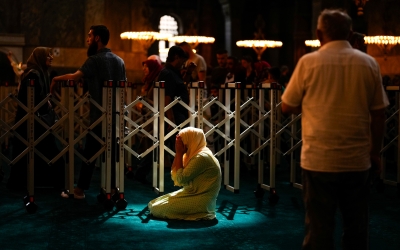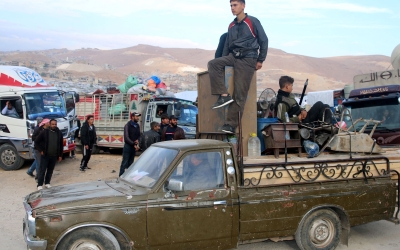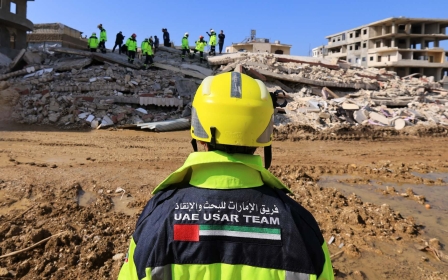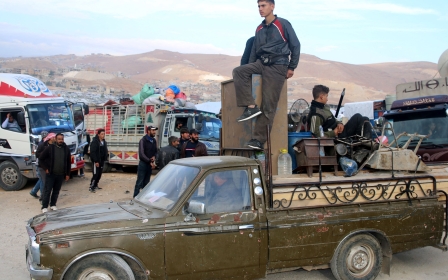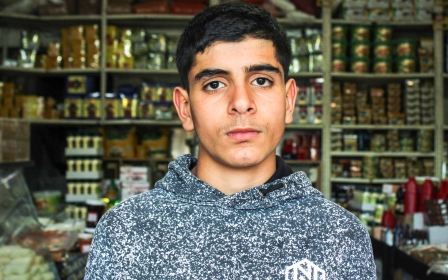Turkey: After being vilified in elections, Syrian refugees are being deported en masse
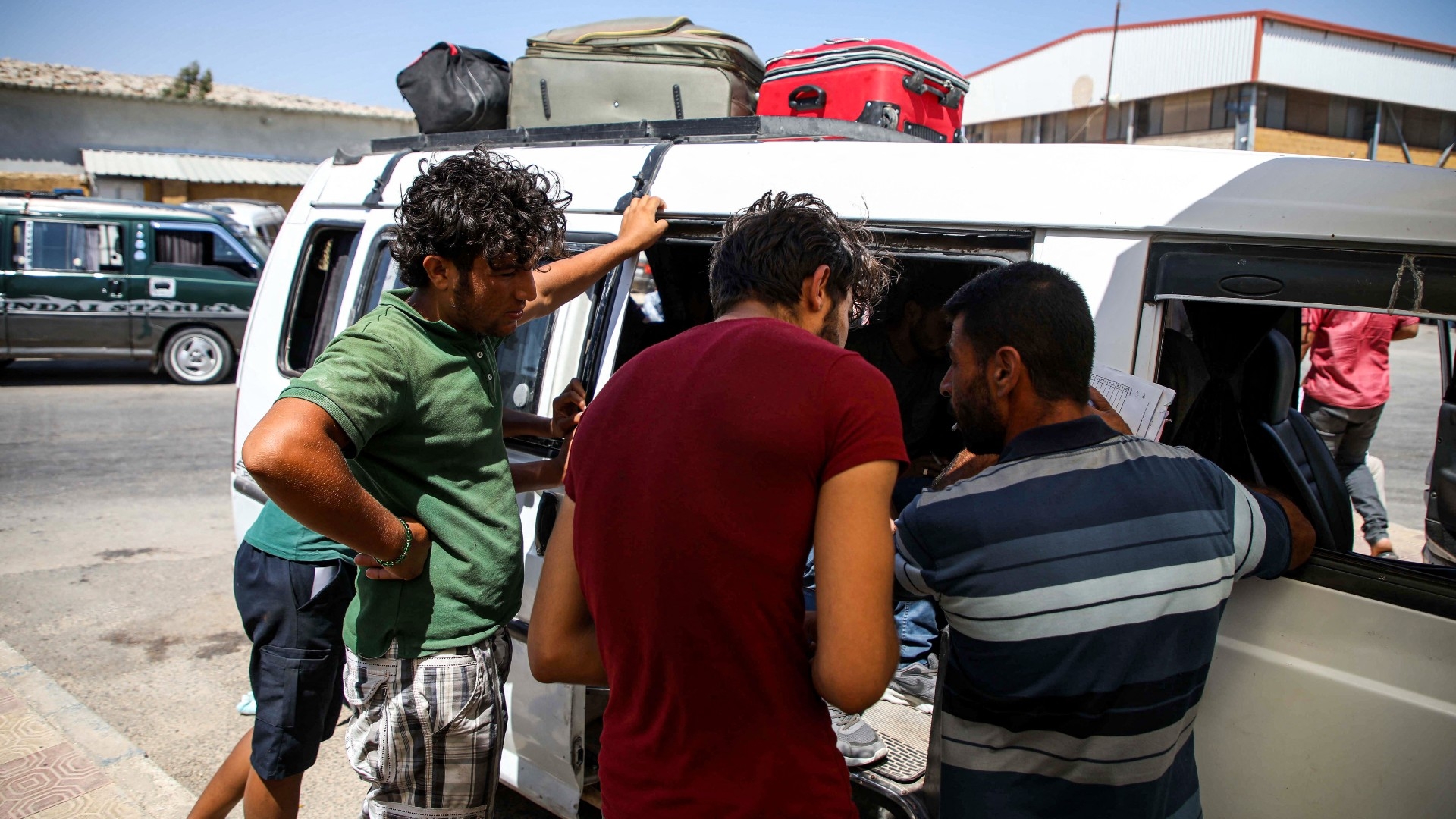
When Khaled Ahmed* went to Istanbul's Presidency for Migration Management to update his address, he had no idea the routine visit would escalate to where it did.
A verbal altercation ensued between him and a government employee, resulting in him being handcuffed, arrested and taken to a prison in another part of the country.
After spending nearly a month in detention in the southern Turkish city of Kilis, where the 53-year-old claims he was "beaten on the face and the legs by a young Turkish policeman," he was reportedly forced to sign a document consenting to his "voluntary" return to northwest Syria.
Now staying at a friend's house in the Syrian city of Azaz, some 10 km from the Turkish border, Ahmed says he fears if he will ever see his wife and children again.
"I have been working and living in Istanbul for eight years, my children go to schools there. We have all the official papers to stay there," he told Middle East Eye.
New MEE newsletter: Jerusalem Dispatch
Sign up to get the latest insights and analysis on Israel-Palestine, alongside Turkey Unpacked and other MEE newsletters
"But now we're divided. I don't know when we'll meet again."
According to the Syrian Observatory for Human Rights (SOHR), more than 950 Syrians, including women and children, have been forcibly deported from Turkey since the beginning of July.
The crackdown began last year but intensified after Turkish President Recep Tayyip Erdogan won May's divisive presidential elections.
'Unfortunately, the plight of Syrian refugees is used by political parties for their own interests'
- Taha al-Ghazi, rights activist
The elections took place amid an alarming rise of xenophobia and discrimination against Syrian refugees, with both candidates promising mass deportations.
Kemal Kilicdaroglu, the 74-year-old opposition candidate, repeatedly vowed to deport all Syrian refugees from the country. Despite his initial support for Syrians fleeing the bloody conflict, Erdogan also promised to "voluntarily" return around one million Syrians to the north of the country.
Speaking on Thursday after returning from a three-nation Gulf tour, Erdogan told reporters that his government was making great strides in its plan.
"The construction of briquette houses in northern Syria continues. We have now reached the figure of 100,000-150,000 briquette houses," he said.
"As we did this, our Syrian refugee brothers started to return."
Scapegoats and targets
Syrian refugees have increasingly become scapegoats for Turkey's economic crisis where Turks have seen their purchasing power dwindle due to skyrocketing inflation accompanied by the rapid depreciation of the Turkish lira.
The refugees have also been labelled a drain on the country's resources and blamed for issues ranging from sexual harassment to looting following February's deadly earthquake.
Taha al-Ghazi, a political analyst and rights activist, said the punitive measures taken by Ankara were disheartening but not surprising.
"Unfortunately, the plight of Syrian refugees is used by political parties for their own interests," he told MEE, adding that Erdogan wanted to expel as many Syrians as possible before next year's municipal elections.
"He knows that Turks want to send refugees back."
According to the UN, Turkey hosts around four million refugees, 3.6 million of whom are forcibly displaced from Syria.
More than 500,000 Syrians are currently registered as living in Istanbul, while cities further south such as Gaziantep, Sanliurfa and Hatay have each taken in hundreds of thousands of refugees.
Nearly every refugee is issued with a temporary protection card, known as a kimlik, which allow them to remain in Turkey until either their country of origin is deemed safe or they voluntarily return.
But Ghazi said the recent spate of deportations was in breach of the UN's 1951 Refugee Convention as the situation in both government-controlled and rebel-held areas of Syria had not improved despite a lull in fighting.
The expulsions also come amid efforts across the Middle East to restore diplomatic relations with Damascus to where they were prior to 2011.
Despite once referring to Syrian President Bashar al-Assad as a "murderer", Erdogan has recently shown a willingness to consider a peace-building summit with the Syrian leader.
Insulted and beaten
Abdulrahman Issa, a 28-year-old who was also deported to northern Syria this month, said he was expelled despite having a valid Turkish residency permit.
"I was insulted and beaten," Issa told MEE. "A policeman caught my hand and forced me to fingerprint my voluntary deportation consent [letter].
"My wife and daughter currently live in Hatay without any financial support, while I live in al-Raqqa which is not my city," he added. "I'm from Aleppo, why send me to Raqqa?"
Several Syrians told MEE that deportations were abusive and heavy-handed, usually involving refugees being taken through border crossings controlled by the US-backed Syrian Democratic Forces.
Now stranded in Raqqa, Issa said it was unlikely he could ever return to Turkey.
"I'm currently waiting to be able to go to Idlib safely, which is hard too. Only then will I ask my wife to leave Turkey and join me there."
A spokesperson for Human Rights Watch (HRW) told MEE that it was hearing "credible information about the mass removal of Syrians to Syria from the Elbeyli camp in Kilis during the Eid holiday in June.
"But the organisation has not undertaken its own new investigation at this point. Such reports would be commensurate with our earlier findings."
The watchdog reported in April that Turkish border guards indiscriminately shot at Syrian civilians along the border.
Asylum seekers and migrants attempting to cross into Turkey were also subject to torture and excessive use of force, it said.
'My whole life was destroyed'
Ahmed Yassin, a 24-year-old who was residing in Ankara governorate, told MEE that he was sleeping when a police patrol knocked on his door at 4 am last December.
He claimed that when he opened the door he was swiftly arrested along with his wife and taken to a police station.
"We were later taken to Ankara prison where we didn’t eat for two days," Yassin said.
"Later, a policeman asked us to sign a paper saying it's just a paper to keep our things at the safe deposit box, but my wife who can read Turkish knew it was a letter consenting to be deported," Yassin added.
When he refused to sign the paper he said he too was beaten into submission.
"I'm currently living in Aleppo. It's not safe here, I don't have a job, my whole life was destroyed."
Still, Yassin counts himself among the fortunate.
Since the start of the year, SOHR has documented at least 11 deaths and 20 injuries at the Syrian-Turkish border at the hands of Turkish border guards.
On Saturday, local media reported that Syrians were erecting tents for an indefinite sit-in in the country's northeast, "aiming to compel Turkish authorities to permit cancer patients to enter Turkey for essential medical treatment".
The campaign was launched after Turkish authorities began refusing entry for cancer patients in February, leading to countless deaths.
Middle East Eye reached out to Turkey's Presidency for Migration Management, which operates under the interior ministry, for comment but did not receive a response by time of publication.
The interior ministry declined to comment with an official referring MEE to Erdogan's statements over the past week.
Note: The names of some of the Syrian refugees mentioned in this article have been altered to protect their identity
Middle East Eye delivers independent and unrivalled coverage and analysis of the Middle East, North Africa and beyond. To learn more about republishing this content and the associated fees, please fill out this form. More about MEE can be found here.


